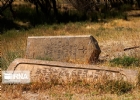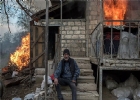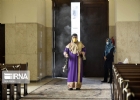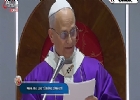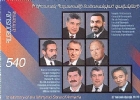
English :
18 Eylül 2023
![]()
![]()
![]()
Is one of Russia’s oldest allies slipping from the Kremlin’s orbit? - 
The arrival of US soldiers for a peacekeeper training exercise in Armenia has rankled the Russian government, which has for decades acted as the sole security guarantor for the former Soviet republic. The 10-day “Eagle Partner” exercise, which began Monday, involves 85 US and 175 Armenian soldiers and aims to prepare the Armenians to take part in international peacekeeping missions.
The exercise, while small in scale, is the latest in a series of what Russia’s foreign ministry has deemed “unfriendly actions” taken by its traditional ally.
Armenia recently sent humanitarian aid to Ukraine for the first time, and its parliament is set to ratify the International Criminal Court’s Rome Statute – meaning it would be obliged to arrest Russian President Vladimir Putin if he were to set foot in the country, which Russia has long viewed as its own backyard.
Armenia’s flirtation with new international partners has been spurred by its frustration that Russia has been unable or unwilling to defend it against what it sees as aggression from neighboring Azerbaijan, and has raised questions about Russia’s ability to retain its hold on countries and conflicts across the former Soviet empire.
Armenian President Nikol Pashinyan said his country was beginning to taste the “bitter fruits” of the “strategic mistake” of trusting Russia with near-exclusive responsibility for his country’s defense.
“Armenia’s security architecture 99.999% was linked to Russia,” he told Italian newspaper La Repubblica earlier this month. “But today we see that Russia itself is in need of weapons… Even if it wishes so, the Russian Federation cannot meet Armenia’s needs.”
Since Pashinyan came to power in 2018 on the back of Armenia’s “Velvet Revolution” – an outpouring of anger against lingering corruption and cronyism in the former Soviet republic – his country has faced growing tensions with Azerbaijan.
The fiercest flashpoint is Nagorno-Karabakh, a landlocked region in the Caucasus Mountains that has been the cause of two wars between the neighbors in the past three decades, most recently in 2020. Nagorno-Karabakh is internationally recognized as part of Azerbaijan, but its inhabitants are mostly ethnic Armenians.
The 44-day conflict in fall 2020 exposed Armenia’s military inferiority. Azerbaijan, armed with drones and F-16 fighter jets provided by Turkey, won a crushing victory, claiming about a third of the territory of Nagorno-Karabakh, as well as attacking Armenia proper.
Russia helped end the war by negotiating a ceasefire. The deal provided for around 2,000 Russian peacekeepers to deploy to Nagorno-Karabakh to guard the Lachin corridor, the only road linking it with Armenia.
But Russia’s peacekeepers have not prevented Azerbaijani troops from establishing a military checkpoint along the Lachin corridor, preventing the import of food to the enclave. Azerbaijain has denied creating a blockade, while Russia has denied accusations of inaction.
An unreliable partner
Russia’s inability or unwillingness to intervene has left many in Armenia’s government feeling betrayed, according to Vahram Ter-Matevosyan, an associate professor of foreign policy at the American University of Armenia, based in the capital, Yerevan.
“Armenia has invested 30 years of its independence – I would even say 200 years of its recent history – in firmly believing that when the time comes and when need arises, Russia would deliver on its strategic obligations and defend Armenia against any foreign aggression. That did not happen in 2020, nor in 2021, nor in 2022,” he told CNN.
This loyalty came with many self-inflicted costs. “Armenia has done almost anything and everything that Russia wanted over the last 30 years,” Ter-Matevosyan said, including halting its efforts toward European integration in 2013 after Moscow voiced its displeasure.
Having danced to Moscow’s tune for so long, Yerevan has come to expect it to deliver on its security commitments, which Russia purports to provide through the Collective Security Treaty Organization (CSTO), a military alliance of post-Soviet states including Armenia. But in recent years, it has come to see a trail of broken promises, analysts say.
“Russia failed to deliver on its promises to secure the Lachin corridor… Russia failed to deliver weapons that Armenia purchased from Russia, Russia failed to curtail Azerbaijan’s expansionist and aggressive behavior against Armenia,” said Ter-Matevosyan.
In response, he said, Armenia has felt it had little choice but to diversify its security apparatus.
Unintended consequences
Some analysts attribute Russia’s failure to uphold the terms of the ceasefire it brokered to its being distracted by its full-scale invasion of Ukraine.
But Marie Dumoulin, director of the Wider Europe program at the European Council on Foreign Relations, said that the situation was in part caused by Russia attempting to keep both Armenia and Azerbaijan on side at once – a task made impossible by Azerbaijan’s continued aggression, she said.
“Since the war in 2020, Russia has been very reluctant to choose between Armenia and Azerbaijan, which concretely meant that they chose Azerbaijan,” Dumoulin told CNN. “It’s a passive attitude. But this passivity in itself is a very pro-Azerbaijan position.”
Dumoulin also pointed to the growing ties between Moscow and Baku – spurred by the personal relationship between Putin and Azerbaijan’s longtime President Ilham Aliyev – which may have come at Yerevan’s expense.
“I don’t think Pashinyan is the kind of leader Putin likes. He’s been brought to power by a revolution. He has this democratic, reformist, anti-corruption discourse. Aliyev is much more the kind of leader Putin can get along with,” said Dumoulin.
Relations between Putin and Pashinyan have not been helped by Armenia’s moves toward becoming a party to the ICC’s Rome Statute, which would give Armenia a new forum to voice human rights concerns against Azerbaijan. Armenia signed the statute in 1999, but its Constitutional Court ruled that its violated the country’s constitution – a decision it reversed in March, paving the way for potential ratification.
But in trying to shore up its security vis-a-vis Azerbaijan, Armenia has inadvertently delivered a stinging snub to Russia. The ICC has an outstanding arrest warrant against Putin over an alleged scheme to deport Ukrainian children.
“The timing was terrible,” said Ter-Matevosyan. But, he claimed, “the Armenian government has done a poor job in clearly explaining to its Russian partners the two meanings behind the process of ratification of the Rome Statute.”
The subsequent announcement of joint military training exercises with the US has soured relations further. Russia summoned the Armenian ambassador to Moscow last week for “difficult” talks, Politico reported.
Kremlin spokesperson Dmitry Peskov said that the exercises do not “help strengthen an atmosphere of mutual trust in the region.”
But Ter-Matevosyan suggested this revealed a paranoia on Moscow’s part.
“With its reaction Russia gave significance to this event that it doesn’t deserve, given its scale and scope. It’s some 260 people armed with rifles – not heavy weaponry – gathering in Armenia for nine to 10 days, to improve what they call ‘the interoperability of peacekeeping forces,’” said Ter-Matevosyan, pointing to the routine nature of such exercises around the world.
“Russia overreacted by questioning the true objectives of the drills and seeing the hand of NATO behind it.”
‘Diluting’ Russian influence
It is not yet clear whether Armenia’s efforts to create new international partnerships are motivated solely by its attempts to bolster its security, or whether these attempts constitute a broader Western pivot.
“As a small state, it’s quite risky for Armenia to do a U-turn, a big geopolitical jump. We know the risks for that,” Anna Ohanyan, an expert in Russian foreign policy and professor at Stonehill College in Massachusetts, told CNN.
Rather than seeking to cut ties with Russia entirely, Armenia is merely “diluting” its influence, Ohanyan said.
But while the steps taken so far might be modest, they could set Armenia down a path from which it is hard to turn back. “If Putin woke up tomorrow and all of a sudden started to pursue different types of policies – providing some specific security guarantees – I do not think that Armenia’s foreign policy would recalibrate back,” said Ohanyan.
“If Russia provided a full spectrum of security for Armenia, that would mean a much deeper integration of Armenia into the Russia neo-imperial sphere, similar to Belarus,” she said – a fate that Armenia’s Velvet Revolution signaled it “will not stand for.”
Stuck in the middle?
Armenia’s leaders are not unaware of the challenges ahead. Speaking to La Repubblica, Pashinyan said he feared that Armenia could end up stuck in the middle, caught between Russia and the West.
“Western countries or experts… qualify Armenia as a pro-Russian country. On the other hand, many circles in Russia consider Armenia or its government… pro-Western,” he said.
Not able to do enough to please either side, Armenia may risk alienating both, leaving itself exposed.
Many in Yerevan have already begun to fear a potential Russian rebuke. This could be economic, since Russia controls huge sections of Armenia’s economy, from telecommunications to energy. The Kremlin banned dairy imports from Armenia in April – ostensibly after some newly discovered health concerns, but in what Ohanyan suggested was a punishment for Yerevan considering the ICC ratification.
Or it could be something worse. “We have to remember that Russia has a huge destructive potential in the region,” said Ter-Matevosyan, referring to Russia’s sizable military base north of Yerevan.
For Ter-Matevosyan, the current Armenian government, whose “ideological roots come from… liberal Western values,” have taken this “opportune moment” to implement “some of their ideas, thoughts and beliefs that they cherished for many years.”
“Will they succeed or not? Time will show. But what is going to be the price for this shift, this diversification? That’s the biggest question that many are asking in Armenia.”
The exercise, while small in scale, is the latest in a series of what Russia’s foreign ministry has deemed “unfriendly actions” taken by its traditional ally.
Armenia recently sent humanitarian aid to Ukraine for the first time, and its parliament is set to ratify the International Criminal Court’s Rome Statute – meaning it would be obliged to arrest Russian President Vladimir Putin if he were to set foot in the country, which Russia has long viewed as its own backyard.
Armenia’s flirtation with new international partners has been spurred by its frustration that Russia has been unable or unwilling to defend it against what it sees as aggression from neighboring Azerbaijan, and has raised questions about Russia’s ability to retain its hold on countries and conflicts across the former Soviet empire.
Armenian President Nikol Pashinyan said his country was beginning to taste the “bitter fruits” of the “strategic mistake” of trusting Russia with near-exclusive responsibility for his country’s defense.
“Armenia’s security architecture 99.999% was linked to Russia,” he told Italian newspaper La Repubblica earlier this month. “But today we see that Russia itself is in need of weapons… Even if it wishes so, the Russian Federation cannot meet Armenia’s needs.”
Since Pashinyan came to power in 2018 on the back of Armenia’s “Velvet Revolution” – an outpouring of anger against lingering corruption and cronyism in the former Soviet republic – his country has faced growing tensions with Azerbaijan.
The fiercest flashpoint is Nagorno-Karabakh, a landlocked region in the Caucasus Mountains that has been the cause of two wars between the neighbors in the past three decades, most recently in 2020. Nagorno-Karabakh is internationally recognized as part of Azerbaijan, but its inhabitants are mostly ethnic Armenians.
The 44-day conflict in fall 2020 exposed Armenia’s military inferiority. Azerbaijan, armed with drones and F-16 fighter jets provided by Turkey, won a crushing victory, claiming about a third of the territory of Nagorno-Karabakh, as well as attacking Armenia proper.
Russia helped end the war by negotiating a ceasefire. The deal provided for around 2,000 Russian peacekeepers to deploy to Nagorno-Karabakh to guard the Lachin corridor, the only road linking it with Armenia.
But Russia’s peacekeepers have not prevented Azerbaijani troops from establishing a military checkpoint along the Lachin corridor, preventing the import of food to the enclave. Azerbaijain has denied creating a blockade, while Russia has denied accusations of inaction.
An unreliable partner
Russia’s inability or unwillingness to intervene has left many in Armenia’s government feeling betrayed, according to Vahram Ter-Matevosyan, an associate professor of foreign policy at the American University of Armenia, based in the capital, Yerevan.
“Armenia has invested 30 years of its independence – I would even say 200 years of its recent history – in firmly believing that when the time comes and when need arises, Russia would deliver on its strategic obligations and defend Armenia against any foreign aggression. That did not happen in 2020, nor in 2021, nor in 2022,” he told CNN.
This loyalty came with many self-inflicted costs. “Armenia has done almost anything and everything that Russia wanted over the last 30 years,” Ter-Matevosyan said, including halting its efforts toward European integration in 2013 after Moscow voiced its displeasure.
Having danced to Moscow’s tune for so long, Yerevan has come to expect it to deliver on its security commitments, which Russia purports to provide through the Collective Security Treaty Organization (CSTO), a military alliance of post-Soviet states including Armenia. But in recent years, it has come to see a trail of broken promises, analysts say.
“Russia failed to deliver on its promises to secure the Lachin corridor… Russia failed to deliver weapons that Armenia purchased from Russia, Russia failed to curtail Azerbaijan’s expansionist and aggressive behavior against Armenia,” said Ter-Matevosyan.
In response, he said, Armenia has felt it had little choice but to diversify its security apparatus.
Unintended consequences
Some analysts attribute Russia’s failure to uphold the terms of the ceasefire it brokered to its being distracted by its full-scale invasion of Ukraine.
But Marie Dumoulin, director of the Wider Europe program at the European Council on Foreign Relations, said that the situation was in part caused by Russia attempting to keep both Armenia and Azerbaijan on side at once – a task made impossible by Azerbaijan’s continued aggression, she said.
“Since the war in 2020, Russia has been very reluctant to choose between Armenia and Azerbaijan, which concretely meant that they chose Azerbaijan,” Dumoulin told CNN. “It’s a passive attitude. But this passivity in itself is a very pro-Azerbaijan position.”
Dumoulin also pointed to the growing ties between Moscow and Baku – spurred by the personal relationship between Putin and Azerbaijan’s longtime President Ilham Aliyev – which may have come at Yerevan’s expense.
“I don’t think Pashinyan is the kind of leader Putin likes. He’s been brought to power by a revolution. He has this democratic, reformist, anti-corruption discourse. Aliyev is much more the kind of leader Putin can get along with,” said Dumoulin.
Relations between Putin and Pashinyan have not been helped by Armenia’s moves toward becoming a party to the ICC’s Rome Statute, which would give Armenia a new forum to voice human rights concerns against Azerbaijan. Armenia signed the statute in 1999, but its Constitutional Court ruled that its violated the country’s constitution – a decision it reversed in March, paving the way for potential ratification.
But in trying to shore up its security vis-a-vis Azerbaijan, Armenia has inadvertently delivered a stinging snub to Russia. The ICC has an outstanding arrest warrant against Putin over an alleged scheme to deport Ukrainian children.
“The timing was terrible,” said Ter-Matevosyan. But, he claimed, “the Armenian government has done a poor job in clearly explaining to its Russian partners the two meanings behind the process of ratification of the Rome Statute.”
The subsequent announcement of joint military training exercises with the US has soured relations further. Russia summoned the Armenian ambassador to Moscow last week for “difficult” talks, Politico reported.
Kremlin spokesperson Dmitry Peskov said that the exercises do not “help strengthen an atmosphere of mutual trust in the region.”
But Ter-Matevosyan suggested this revealed a paranoia on Moscow’s part.
“With its reaction Russia gave significance to this event that it doesn’t deserve, given its scale and scope. It’s some 260 people armed with rifles – not heavy weaponry – gathering in Armenia for nine to 10 days, to improve what they call ‘the interoperability of peacekeeping forces,’” said Ter-Matevosyan, pointing to the routine nature of such exercises around the world.
“Russia overreacted by questioning the true objectives of the drills and seeing the hand of NATO behind it.”
‘Diluting’ Russian influence
It is not yet clear whether Armenia’s efforts to create new international partnerships are motivated solely by its attempts to bolster its security, or whether these attempts constitute a broader Western pivot.
“As a small state, it’s quite risky for Armenia to do a U-turn, a big geopolitical jump. We know the risks for that,” Anna Ohanyan, an expert in Russian foreign policy and professor at Stonehill College in Massachusetts, told CNN.
Rather than seeking to cut ties with Russia entirely, Armenia is merely “diluting” its influence, Ohanyan said.
But while the steps taken so far might be modest, they could set Armenia down a path from which it is hard to turn back. “If Putin woke up tomorrow and all of a sudden started to pursue different types of policies – providing some specific security guarantees – I do not think that Armenia’s foreign policy would recalibrate back,” said Ohanyan.
“If Russia provided a full spectrum of security for Armenia, that would mean a much deeper integration of Armenia into the Russia neo-imperial sphere, similar to Belarus,” she said – a fate that Armenia’s Velvet Revolution signaled it “will not stand for.”
Stuck in the middle?
Armenia’s leaders are not unaware of the challenges ahead. Speaking to La Repubblica, Pashinyan said he feared that Armenia could end up stuck in the middle, caught between Russia and the West.
“Western countries or experts… qualify Armenia as a pro-Russian country. On the other hand, many circles in Russia consider Armenia or its government… pro-Western,” he said.
Not able to do enough to please either side, Armenia may risk alienating both, leaving itself exposed.
Many in Yerevan have already begun to fear a potential Russian rebuke. This could be economic, since Russia controls huge sections of Armenia’s economy, from telecommunications to energy. The Kremlin banned dairy imports from Armenia in April – ostensibly after some newly discovered health concerns, but in what Ohanyan suggested was a punishment for Yerevan considering the ICC ratification.
Or it could be something worse. “We have to remember that Russia has a huge destructive potential in the region,” said Ter-Matevosyan, referring to Russia’s sizable military base north of Yerevan.
For Ter-Matevosyan, the current Armenian government, whose “ideological roots come from… liberal Western values,” have taken this “opportune moment” to implement “some of their ideas, thoughts and beliefs that they cherished for many years.”
“Will they succeed or not? Time will show. But what is going to be the price for this shift, this diversification? That’s the biggest question that many are asking in Armenia.”
Bu haber cnn kaynağından gelmektedir.
Haber metninde yer alan görüşler haber kaynağı (cnn) ve yazarına ait olup,
bolsohays.com sitesi haber hakkında herhangi bir görüş üstlenmemektedir.
Opinions expressed are those of the author(s)-(cnn). They do not purport to reflect the opinions or views of bolsohays.com
Diğer Haberler
-
Ohanian Becomes First Armenian-American to Receive Best Picture Oscar Nomination
-
Pashinyan Announces Beginning of Renewal of Armenian Apostolic Church
-
Azerbaijan-Armenia normalization push set to carry into 2026
-
Pashinyan Urges Karabakh Armenians to Embrace Armenian Citizenship for Security
-
Armenia adopts universal healthcare insurance
-
Armenia pays mothers $1,300 for each child born
-
Photography of Ancient Armenia Featured in New 2026 Wall Calendar
-
Pope asks for prayers ahead of visit to Türkiye and Lebanon
-
Armenia will step up its efforts toward membership in the European Union in 2026
-
Economy Minister discussed rebranding of Armenian brandy with producers
-
Aleppo - Yerevan - Aleppo
-
Mirzoyan: Armenia citizens should live in Armenia, Azerbaijan citizens should live in Azerbaijan
Foto Galeri Tüm Galeriler
Video Galeri Tüm Videolar
Anket Tüm Anketler
Günün Sözü
Իմաստութեան մեծագոյն եւ բացայայտ ապացոյցը մնայուն զուարթութիւնն է։











